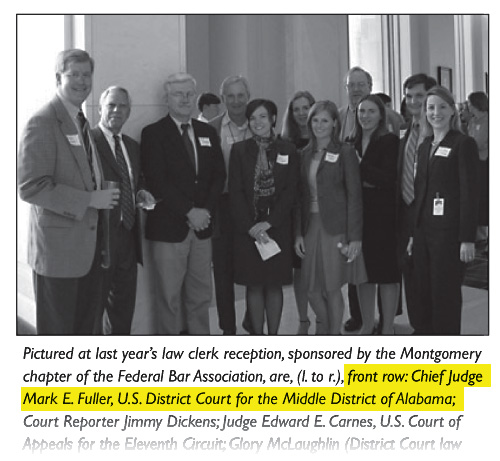We’re getting to know Judge Mark Everett Fuller, the judge in the Don Siegelman case. In the first two installments [1] [2], we discussed how Fuller came to be selected as a judge, his long, in-the-trenches relationship with the Alabama G.O.P. (serving on its Executive Committee), and his special relationship with his political mentor, Representative Terry Everett. Today we will explore the dispute that arose just as Fuller was moving to the federal bench.
Fuller’s tenure as District Attorney for Alabama’s 12th Judicial Circuit lasted from 1997, when he was appointed by Republican Governor Fob James, through 2002, when, based on recommendations from Alabama Republican Senators Richard Shelby and Jefferson Sessions, he was nominated by President George W. Bush for a federal judgeship in the Middle District of Alabama in Montgomery. Fuller was confirmed in November 2002.
A routine state audit of Fuller’s office for the period from October 1999 to April 2001, found that “there were a few incidents of insufficient or incomplete documentation of disbursements” at the office. (A copy of the audit report can be found here.) State auditors recognized that Fuller, as district attorney, had very broad discretion in budget, so they did nothing to challenge these payments.
Fuller’s replacement Gary McAliley, however,

The Retirement Systems of Alabama (RSA), which administers pension payments to former state employees, determined that the payments to DeVane were irregular and decided not to take them into account in calculating DeVane’s retirement benefits. DeVane went to court to force their hand. His star witness: Mark Fuller, now a federal judge in Montgomery. Fuller testified that he could legally pay DeVane any salary he wished and expressed the view that the state was bound to support his decision.
The following editorial, in the RSA’s newsletter Advisor in September 2003, described the case as the RSA saw it:
In December of last year, Judge Fuller appeared before the ERS Board wanting to “spike the retirement benefit” for a former employee, Mr. Bruce DeVane. When Judge Fuller was District Attorney for Pike County, he had given Mr. DeVane an 89% pay increase from $80,301 to $152,014 for one year only. If this additional payment were considered regular salary, his retirement income would have been increased by $1,000 per month or $330,000 over his expected lifetime. The Board rightfully denied the benefit spike. The Montgomery Advertiser editorial of December 5, 2002, congratulated the Board in standing tall to prevent a “ . . . back loading of salaries to boost pensions . . . .”
On February 22, 2006, the Enterprise Ledger summarized the case as follows:
A former investigator for Coffee and Pike counties has not given up claims that the state owes him an additional $14,000 a year in retirement. Even though a Montgomery County judge dismissed Bruce DeVane’s case against the Retirement Systems of Alabama, DeVane’s attorney is hopeful the Alabama Court of Civil Appeals will reverse the judge’s decision.
In a civil lawsuit that took nearly two years to settle, Judge Eugene Reese, upheld a decision by RSA to spare Alabama taxpayers and deny DeVane’s claims to what RSA refers to as “extraordinary compensation.” During the January 2004 bench trial, DeVane’s former boss, U.S. District Judge Mark Fuller, who was district attorney for Coffee and Pike counties at that time, testified on behalf of DeVane. As DeVane’s boss, Fuller claims he could legally pay DeVane any salary he deemed suitable . . . .
Indeed, RSA lawyers had argued successfully that the jump in DeVane’s salary constituted an “extraordinary” circumstance that did not merit attention in calculating DeVane’s overall retirement pay. D.A. Gary McAliley, who did not return calls requesting comment, testified that the payments were, as a matter of operating procedure within his office, extraordinary. The state court sided with the RSA and McAiley, rejecting the views put forth by Fuller.
The head of the RSA is David G. Bronner—a highly regarded figure in Alabama’s state administration who oversees billions in pension funds. Bronner did not respond to my requests for comment, but he did publish a column on the matter, entitled “Sarcasm: Justice in Bama,” in the August 2007 Advisor. In the piece, he draws a connection between the DeVane case and the fact that Fuller later refused to grant the RSA the ability sue Enron in Alabama state court. He wrote:
I do not like U.S. District Judge Fuller nor does he like me. The RSA had to go through the entire state court system to prevent Judge Fuller’s buddy from ripping off the RSA. Shortly thereafter, Judge Fuller tried to sandbag the RSA by preventing our claim (by doing nothing) against the ultimate crook–Enron! Fortunately, the RSA prevailed on both issues.
In 2002, in the wake of the audit, Fuller simply said that the criticism of him was “politically motivated.”
But think about that for a moment. Fuller, an Alabama Republican stalwart, leaves for the federal bench—then finds his work as District Attorney under investigation by his replacement Gary McAliley. Fuller’s federal position was secure but his reputation was bruised, and he responded to his critics by insisting he left the D.A.’s office in “sound financial condition.” But he also let it be known that he felt that he was under political attack—by a recent Siegelman appointee. Given that, ask yourself: why would Fuller, a man with very good reason to have a grudge against Siegelman’s entire operation, not recuse himself from judging Siegelman?
To me, it looks like there was a score to settle.
Judge Fuller has not responded to a request for comment. I’ll update this post if and when he does.
Next… Fuller conducts the trial of Don Siegelman, and questions abound.
Evan Magruder contributed to this blog post.


